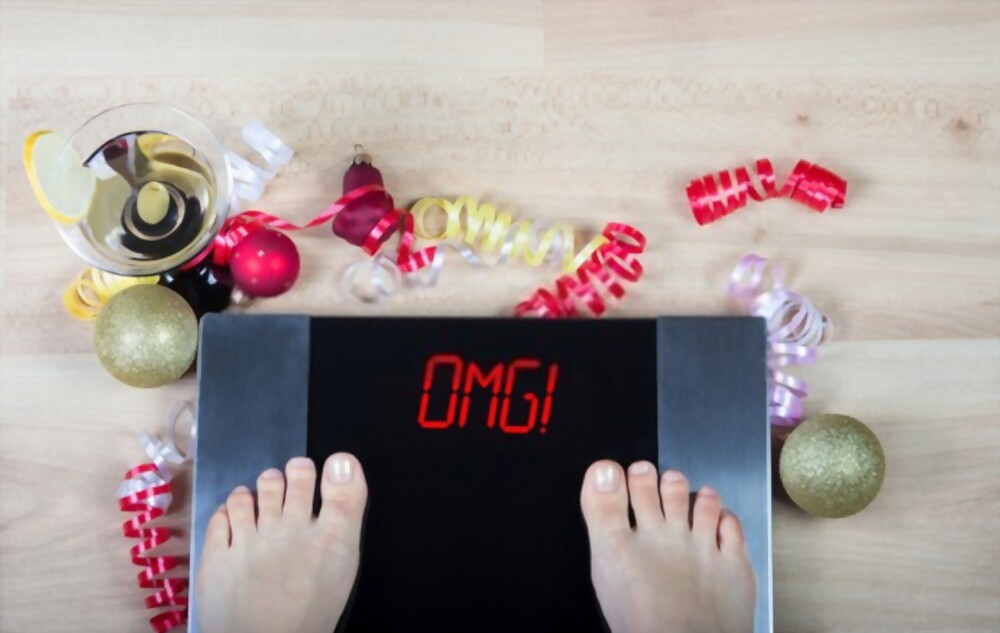
Gaining weight is a battle for most skinny guys. Even fit and active people find it challenging to put on weight because our body has its own set of rules. To gain weight, you need to take in more calories than you burn. It sounds simple, but many fail at executing this principle.
Let's see why most men find it hard to gain weight and how we can tackle this challenge and give ourselves an edge with these hacks!
What's The Basic Principle of Gaining Weight?
A good way to conceptualize gaining weight is to think about what happens to your body when you're pregnant. You consume more calories than usual, and this excess energy is stored in the form of fats and proteins.
Similarly, in the case of skinny guys, you need to consume more calories than you burn. The general rule is that you need to take in about 500 extra calories per day to gain one pound of weight in a week. To gain one pound of muscle, you need to take in roughly 1250 calories extra per day.
How Can You Know if You're On Track to Gain Weight?
If you're a skinny guy and have been trying to gain weight for a while, there is a good chance that you are doing everything right but are not seeing the desired results. In such cases, it's important to look at the problem from the inside out.
In the process of gaining weight, you need to take in more calories than you burn. You can track your calorie consumption with an app like MyFitnessPal. You can also keep a food diary to keep track of your daily calorie intake.
6 Tips to Help You Gain Weight in 30 Days
1. Eat High-Calorie Foods
A lot of skinny guys tend to eat less when trying to gain weight. This is a common but costly mistake. If you want to gain weight, you need to eat calorie-dense food. Ideally, you should eat at least three high-calorie meals per day.
You can also consume calorie-dense snacks between meals. The best foods for gaining weight are those that are high in nutrients and low in calories.
This will help you to eat enough calories without exceeding your daily limit and gaining unnecessary fat. A diet plan rich in vegetables, fruits, whole grains, and lean protein is especially helpful for those who are trying to put on weight. Supplements like protein shakes or bars can also be very helpful in giving your muscles the nutrients they need to grow bigger and faster.
2. Eat More Often
You can increase the number of calories per meal by eating larger portions or choosing high-calorie foods. Eating more often will keep your metabolism elevated and prevent overeating. It's also easier to overeat if you eat larger meals less often.
Eating five small meals (about 250 calories each) throughout the day will keep your metabolism elevated and prevent overeating. Avoid eating too much at one time because this can cause discomfort and make it difficult to fall asleep. Avoid sugary or carb-rich foods before bedtime because they can cause insomnia.
3. Pack on The Calories
In the case of skinny guys, it's challenging to gain weight because of their high metabolism. It's not easy to put on weight when your metabolism is high. One way you can tackle this challenge is to pack on the calories by eating high-calorie foods.
Another way to increase your calorie intake is to up the amount of fat in your diet. Fat has more than double the amount of calories compared to carbs and protein. You may also up your intake of carbs by eating more starchy carbs such as pasta, rice, and potatoes. These are all examples of foods that are high in calories.
4. Lift heavy weights
If you want to gain weight, you need to lift heavy weights. Muscle weighs more than fat, so lifting weights helps you put on weight quickly.
To lift heavy weights, you need to focus on lifting the heaviest load that you can lift for only a few repetitions. You should be lifting until you feel muscle fatigue and near muscle failure. If you lift too light of a weight, you may not get the maximum benefits of weightlifting.
The right weight will depend on your current physical condition. If you are very out of shape, start with lifting only a very light weight (5-10 lbs.) and gradually increase the load as you become stronger.
5. Sleep Well
When you sleep well, your body has the opportunity to recover and rebuild. You need to sleep for at least 7 hours per day to gain weight.
During this time, your body is doing all of the things that it needs to do to make sure that you are healthy and functioning optimally. When you sleep, your body resets its hormones, repairs your muscles, and repairs your body from the inside out. Sleep is just as important as diet if you want to gain weight.
6. Drink Plenty of Water
Water is not just for health; it's also important for gaining weight. You ought to drink enough water every day to support digestion, hydrate your body and help flush toxins.
Water also helps you feel fuller, which can be helpful if you're trying to gain weight. If you struggle with water retention, drinking water instead of sugar-sweetened beverages will help you shed pounds.
And most importantly, water is essential for overall health. Our bodies need water to survive.
How to Slow Your Metabolism and Gain Weight?
Metabolism is the process by which your body converts food into energy. When you eat more calories than you burn off, your body stores that extra energy as fat. But if you eat fewer calories than you burn, your body will break down some of that fat to get the energy it needs. And that brings us to the core concept in this section:
To slow your metabolism and gain weight, you have to eat fewer calories than you burn off every day.
So how do you do that?
It is possible to gain 1-2 pounds per week in 30 days if you eat these particularly healthy and nutritious meals. These meals will not solely help you gain weight but also improve your overall health.
1. High-protein meals
Eating more protein is one of the best ways to help you gain weight. Protein is the most filling macronutrient, and it's harder to overeat than carbs or fat. To slow down your metabolism and gain weight, increase your daily intake of protein-rich foods.
Some examples of high-protein foods include eggs, fish, chicken, nuts and seeds, tofu, nuts, beans, and dairy products.
2. High-fiber meals
Gaining weight often involves eating more carbs, which is why many people recommend increasing your intake of high-fiber foods. High-fiber foods, such as whole grains, legumes, fruits, and vegetables, are naturally high in carbohydrates.
The Institute of Medicine recommends that you get about 35 to 38 grams of fiber per day for women and 38 to 50 grams per day for men.
Eating lots of high-fiber foods can help you gain weight in two ways: It increases your calorie intake, and it makes you feel fuller longer. Fiber acts like a sponge, soaking up water and expanding inside your stomach.
Dietary fiber can also slow down digestion. It may also be helpful for people with type 2 diabetes, as it can improve blood sugar control and insulin sensitivity.
3. High-calorie meals
If you're having trouble gaining weight, no matter how much you eat, you may have to increase the amount of calories you consume on a daily basis.
The best way to do this is through high-calorie snacks like nuts, smoothies, and chocolate bars. Other high-calorie foods you can add to your diet include coconut oil, whole milk, and full-fat cheese.
Eating high-calorie foods is a good idea if you're trying to gain weight quickly. Don't try to change your regular diet too quickly, though. You may end up gaining too much fat and weight, which isn't healthy and could worsen your prognosis.
Conclusion
Your metabolism affects how quickly you'll put on weight. High metabolism is always a good thing, but it can also make it more difficult to gain weight.
When you eat fewer calories than your body needs, your body will begin to break down stored fat for energy. This process of breaking down stored fat is called “metabolism.”
The faster your metabolism, the faster you'll break down fat, but it also means that you'll burn fewer calories overall.
If you want to gain weight, you should aim to maintain or increase your metabolism to increase the amount of calories your body burns throughout the day.
When your metabolism is high, you may be able to eat more calories than if you had a slower metabolism. However, if you have a high metabolism and exercise regularly, you don't need to worry about gaining weight.

